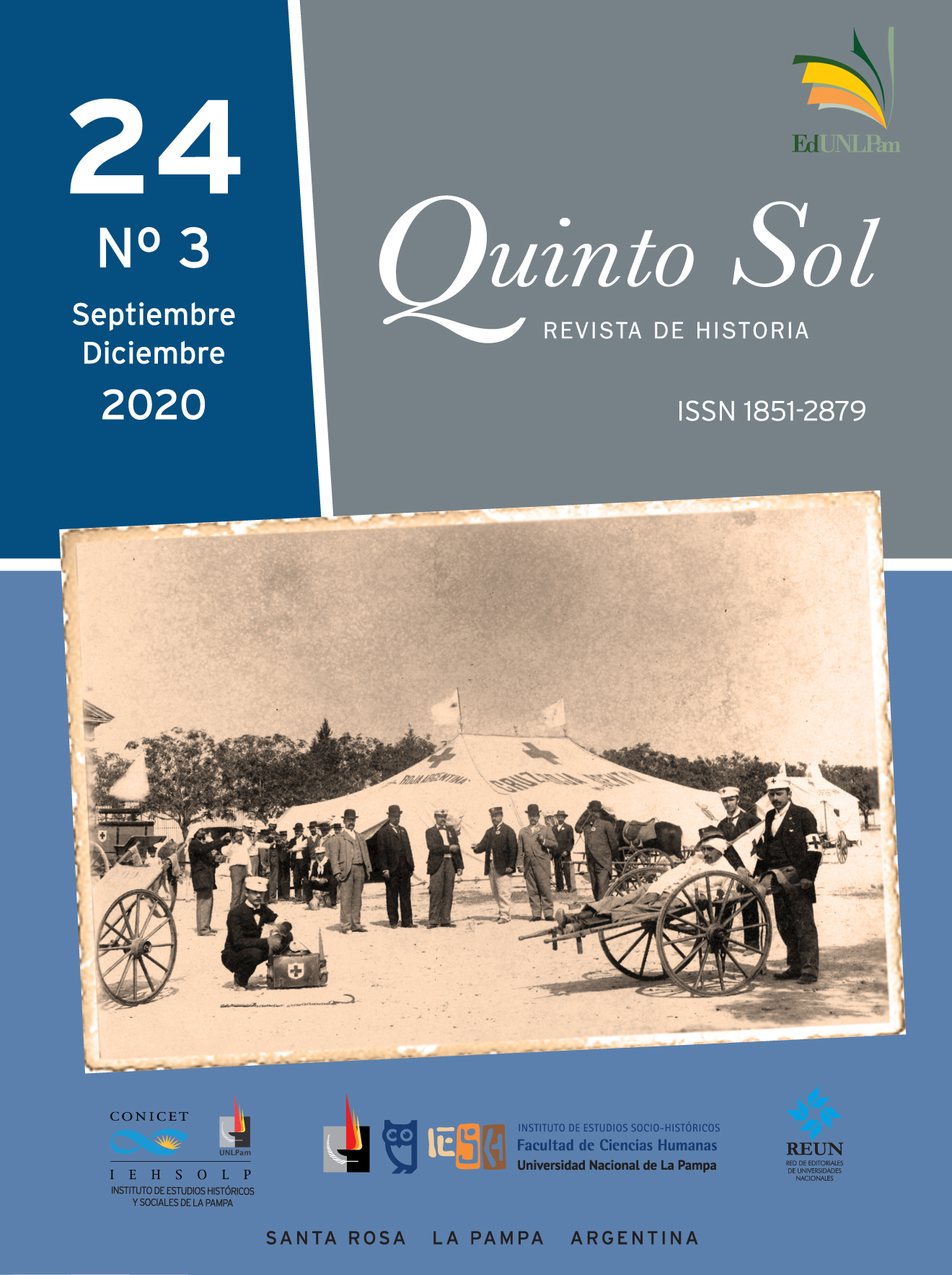On anti-Peronism and political radicalization: the opposition to the state of internal war (1951-1955)
DOI:
https://doi.org/10.19137/qs.v24i3.3837Keywords:
peronism, democracy, political identitiesAbstract
After the failed military coup led by Benjamín Menéndez in September 1951, Perón sanctioned the state of internal war, which was not a legal figure included in the Constitution reformed two years ago. This law, in force until the fall of the government in 1955, was justified by the ruling party against the destabilization attempts made by the opposition parties. However, for the anti-Peronist camp, which had been experiencing a process of political radicalization, this figure summarized the growing governmental restrictions of the previous years and consolidated the breakdown of the rule of law.
This paper analyzes how the opposition parties to the Peronist government understood the state of war and how their rejection was inscribed in the belligerent political climate that prevailed during the second presidency of Perón. The main hypothesis suggests that the sanction of this law by the Executive Power was decisive for the construction of an anti-Peronist discourse that declared the definitive rupture of democracy. This deepened the preference of opposition groups for extra-institutional strategies to confront the government.
Downloads
References
Aboy Carlés, G. (2005). Populismo y democracia en la Argentina contemporánea. Entre el hegemonismo y la refundación. Estudios Sociales, 28 (15), 125-149.
Aboy Carlés, G. (2013). De lo popular a lo populista o el incierto devenir de la plebe. En G. Aboy Carlés, S. Barros y J. Melo. Las brechas del pueblo. Reflexiones sobre identidades políticas y populismo (pp. 17-40). Buenos Aires, Argentina: Universidad Nacional de General Sarmiento-Universidad Nacional de Avellaneda.
Anales de Legislación Argentina (1951). Tomo XI-a. Buenos Aires, Argentina: La Ley.
Azzolini, N. (2018). Los tiempos de la democracia. Conceptos, identidades y debates políticos durante el primer peronismo (1943-1955). Villa María, Argentina: Eduvim.
Bisso, A. (2005). Acción argentina. Un antifascismo nacional en tiempos de guerra mundial. Buenos Aires, Argentina: Prometeo.
Cesano, J. (2006). El sistema penal durante el primer peronismo (1946-1955): a propósito de ciertas interpretaciones. Boletín Americanista, 56, 69-88.
Constitución de la Nación Argentina (1949). Buenos Aires, Argentina: Presidencia de la Nación.
Ferreyra, S. (2018). El peronismo denunciado. Antiperonismo, corrupción y comisiones investigadoras durante el golpe de 1955. Mar del Plata, Argentina: Eudem.
García Holgado, B. (2015). Radicalización política, preferencias normativas y cambio de régimen político: un estudio de caso sobre el primer peronismo (1946-1955). Tesis de Maestría en Ciencia Política. Universidad Torcuato Di Tella, Buenos Aires.
García Sebastiani, M. (2005). Los antiperonistas en la Argentina peronista. Radicales y socialistas en la política argentina entre 1943 y 1951. Buenos Aires, Argentina: Prometeo.
Herrera, C. (2016). ¿Adiós al proletariado? El Partido Socialista bajo el peronismo (1945-1955). Buenos Aires, Argentina: Imago Mundi.
Linz, J. J. (1991) [1978]. La quiebra de las democracias. Buenos Aires, Argentina: Alianza.
Nállim, J. (2014). Las raíces del antiperonismo. Orígenes históricos e ideológicos. Buenos Aires, Argentina: Capital Intelectual.
Partido Socialista (1953). XXXIX Congreso Nacional del Partido Socialista (30° Congreso Ordinario). Informes y proposiciones. Mar del Plata, Argentina. 11 al 13 de abril.
Partido Socialista (1956). XLI Congreso Nacional del Partido Socialista (31° Congreso Ordinario). Informes y proposiciones. Buenos Aires, Argentina. 27 de junio al 1 de julio.
Petra, A. (2017). Intelectuales y cultura comunista. Itinerarios, problemas y debates en la Argentina de posguerra. Buenos Aires, Argentina: Fondo de Cultura Económica.
Pizzorno, P. (2018). Orígenes, trayectorias y radicalización de la identidad antiperonista durante el primer peronismo (1943-1955). Tesis de doctorado en Ciencias Sociales. Universidad de Buenos Aires, Buenos Aires.
Pontoriero, E. (2019). Pensar el estado de excepción desde la historia reciente argentina: claves teóricas e históricas de un objeto complejo. Conflicto social, 12 (21), 6-27.
Reyes, C. (1987). La farsa del peronismo. Buenos Aires, Argentina: Sudamericana.
Sarrabayrouse, E. (2015). El derecho penal del primer peronismo y los fusilamientos de junio de 1956. Revista de Historia del Derecho, 50, 131-226.
Sigal, S. y Verón, E. (2003) [1986 edición original]. Perón o muerte. Los fundamentos discursivos del fenómeno peronista. Buenos Aires, Argentina: Editorial Universitaria de Buenos Aires.
Spinelli, M. E. (2005). Los vencedores vencidos. El antiperonismo y la “revolución libertadora”. Buenos Aires, Argentina: Biblos.
Svampa, M. (2006) [1994 edición original]. El dilema argentino: civilización o barbarie. Buenos Aires, Argentina: Taurus.
Tcach, C. (2006) [1991 edición original]. Sabattinismo y peronismo. Partidos políticos en Córdoba (1943-1955). Buenos Aires, Argentina: Biblos.
Torre, J. C. (2011) [1990 edición original]. La vieja guardia sindical y Perón. Buenos Aires, Argentina: Ryr.
Downloads
Published
Issue
Section
License
When submitting their contributions, authors must declare that they have the permission of the file or repository where the documents that are attached to the work were obtained, whatever their format (unpublished manuscripts, images, audiovisual files, etc.). Such permission authorizes their publication and reproduction, releasing the journal and its editors from any liability or claim from third parties.
Likewise, authors must adhere to the Creative Commons license called "Attribution - Non-Commercial CC BY-NC-SA", through which the author allows copying, reproducing, distributing, publicly communicating the work and generating derivative works, as long as the original author is properly quoted and acknowledged. It is not allowed, however, to use the work for commercial purposes. Authors may establish additional agreements for the non-exclusive distribution of the version of the paper published in the journal (for example, placing it in an institutional repository or publishing it in a book), with the acknowledgment of having been published first in this journal.
The publication of content in this journal does not imply any royalty or charge for taxpayers.
Quinto Sol adheres to the DORA (Declaration on Research Assessment) signed in San Francisco, California, on December 16, 2012, and to the Declaration of Mexico (Joint Declaration LATINDEX - REDALYC - CLACSO - IBICT).










4.png)
2.png)












_(2).png)


1.jpg)



1.jpg)





